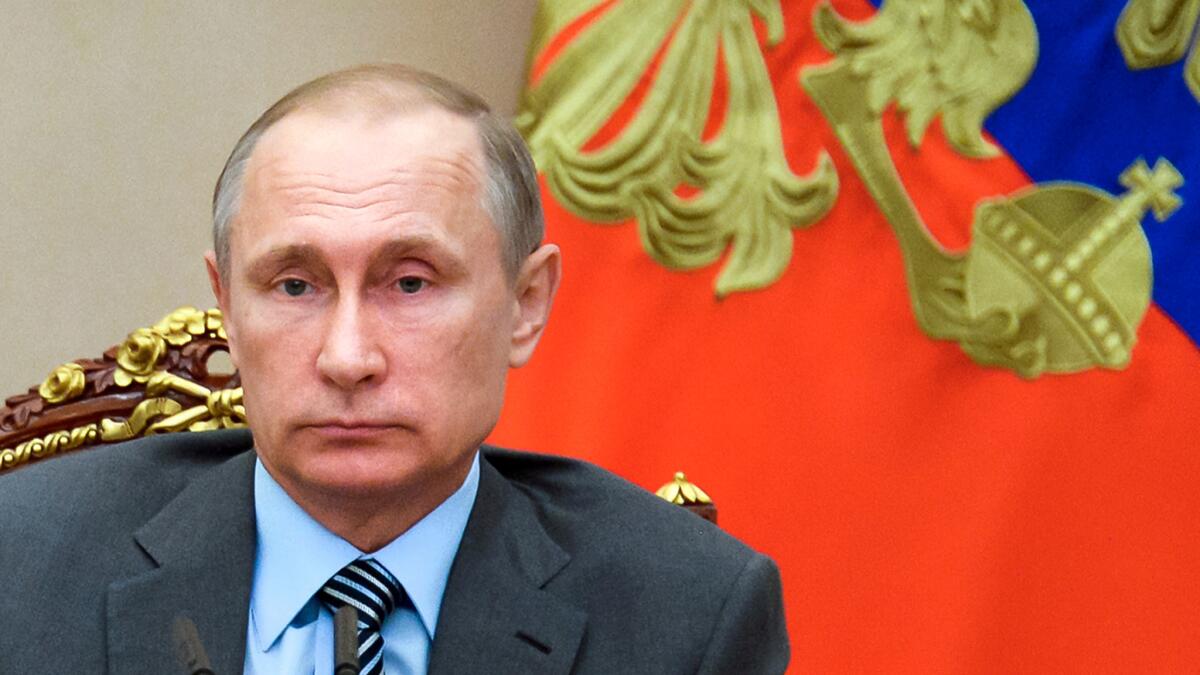Op-Ed: Trump’s opposition research firm: Russia’s intelligence agencies

Russian President Vladimir Putin chairs a meeting of Russia’s cabinet in the Kremlin in Moscow on July 22.
As a lifelong Republican, I don’t much care who runs the Democratic National Committee. But I am deeply disturbed by the way that Debbie Wasserman Schultz was forced to resign as the DNC head over the weekend. WikiLeaks released 20,000 stolen emails revealing a clear, if unsurprising, preference for Hillary Clinton over Bernie Sanders among Democratic officials. This appears to be a foreign intervention in American politics — and it may only be the beginning.
Last month, CrowdStrike, a cybersecurity firm hired by the DNC, traced the source of the leaks to two groups of hackers (“Cozy Bear” and “Fancy Bear”) associated with two Russian intelligence agencies. Moscow’s virtual fingerprints are all over this operation, including hyperlinks in Cyrillic and Internet protocol addresses linked to previous Russian hacks. In short, this appears to be a Russian intelligence operation designed to damage Clinton.
The Russians have every reason to sabotage the Democratic candidate. Her opponent, Donald Trump, is more pro-Russia than any previous presidential candidate. As far back as 2007, Trump was telling CNN that Russian President Vladimir Putin was doing a “great job.” In 2013, Trump tweeted: “Do you think Putin will be going to The Miss Universe Pageant in November in Moscow - if so, will he become my new best friend?” In 2015, Trump told MSNBC that Putin was a real leader, “unlike what we have in this country,” and that reports of Putin killing political opponents didn’t bother him — “Well, I think our country does plenty of killing also,” he said.
Trump repeatedly says he would “get along very well with” Putin. In return Putin has praised Trump as “bright and talented.” Trump positively glows as he repeats reports that “Putin likes me.”
The Trump-Russia links beneath the surface are even more extensive, as Franklin Foer has shown in Slate. Trump has sought and received funding from Russian investors for his business ventures, especially after most American banks stopped lending to him following his multiple bankruptcies. Trump’s de facto campaign manager, Paul Manafort, was a longtime consultant to Viktor Yanukovich, the Russian-backed president of Ukraine who was overthrown in 2014. Manafort also has done multimillion-dollar business deals with Russian oligarchs.
Trump has sought and received funding from Russian investors for his business ventures, especially after most American banks stopped lending to him.
Trump’s foreign policy advisor Carter Page has his own business ties to the state-controlled Russian oil giant Gazprom. He recently delivered a speech in Moscow slamming the United States for its “hypocritical focus on ideas such as democratization” and praising Russia for a foreign policy supposedly built on “noninterference,” “tolerance” and “respect.” (Try telling that to Ukraine.) Another Trump foreign policy advisor, retired Army Lt. Gen. Michael Flynn, flew to Moscow last year to attend a gala banquet celebrating Russia Today, the Kremlin’s propaganda channel, and was seated at the head table near Putin. Flynn is a regular guest on Russia Today; he refuses to say whether he gets paid.
Given the pro-Putin orientation of Trump and his circle, it is no surprise that his campaign quietly rolled back a call in the GOP platform for arming Ukraine to fight back against Russian aggression, as most Republican foreign-policy experts have advocated. Trump has more than once criticized NATO, the chief obstacle to Russian designs, as obsolete and has said he wouldn’t necessarily come to the aid of the North Atlantic Treaty Organization’s members if they are attacked by Russia. Trump also cheered Britain’s vote to exit the European Union, another institution that Putin sees as an impediment to his influence.
Trump’s campaign — whose slogan might as well be “Make Russia Great Again”— presents Putin with a once-in-a-lifetime opportunity to reorient American foreign policy in Russia’s favor. Without the countering influence of the U.S., Putin has a good chance to achieve his dream of undoing the collapse of the Soviet Union, which he has called a “geopolitical catastrophe,” by re-swallowing Latvia, Lithuania, Estonia and other former Soviet republics.
Putin may just be getting started in his campaign to elect Trump. Bloomberg reported in June the Clinton Foundation was breached by Russian hackers. The Russians may also have acquired the emails that Hillary Clinton sent as secretary of State. Putin might be holding back explosive material until October, when its release could ensure a Trump victory.
Such a development ought to alarm all Americans, even Republicans. The idea of a hostile foreign power interfering in a U.S. election is a threat to our democracy, one that Republican leaders would be condemning if they hadn’t checked their principles at the gate in exchange for tickets on the Trump Train.
Max Boot is a senior fellow at the Council on Foreign Relations and a contributing writer to Opinion.
Follow the Opinion section on Twitter @latimesopinionand Facebook
ALSO
The media has cried wolf about GOP candidates for ages. Now no one will listen to warnings on Trump
If Trump wins, a coup isn’t impossible here in the U.S.
Editorial: Democrats see a silver lining in an email release
More to Read
A cure for the common opinion
Get thought-provoking perspectives with our weekly newsletter.
You may occasionally receive promotional content from the Los Angeles Times.










